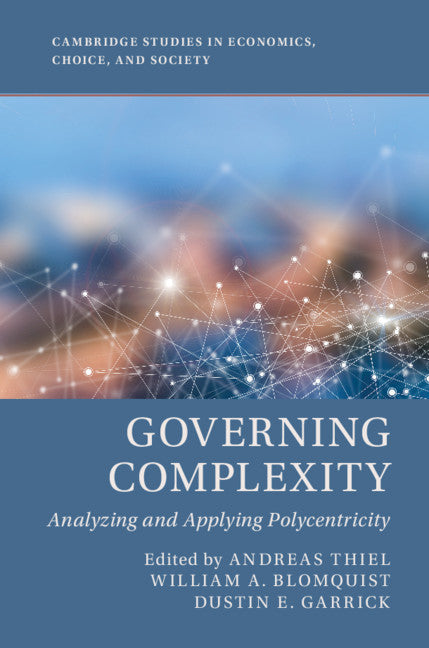Freshly Printed - allow 8 days lead
Couldn't load pickup availability
Governing Complexity
Analyzing and Applying Polycentricity
This book explains why governance is polycentric and what that means in practice, using examples of complex natural resource management.
Andreas Thiel (Edited by), William A. Blomquist (Edited by), Dustin E. Garrick (Edited by)
9781108419987, Cambridge University Press
Hardback, published 3 October 2019
310 pages
23.5 x 15.7 x 2.1 cm, 0.57 kg
'This book is both well written and carefully structured and edited, making it valuable not only for all social scientists interested in learning about the Ostroms' take on polycentricity and public choice, but also for those interested in applying and extending the ideas of self-governance and polycentric governance to uncharted territories such as pandemics, financial crises, migration, climate change, and cybersecurity, among other pressing fields of inquiry.' Pablo Paniagua, Public Choice
There has been a rapid expansion of academic interest and publications on polycentricity. In the contemporary world, nearly all governance situations are polycentric, but people are not necessarily used to thinking this way. Governing Complexity provides an updated explanation of the concept of polycentric governance. The editors provide examples of it in contemporary settings involving complex natural resource systems, as well as a critical evaluation of the utility of the concept. With contributions from leading scholars in the field, this book makes the case that polycentric governance arrangements exist and it is possible for polycentric arrangements to perform well, persist for long periods, and adapt. Whether they actually function well, persist, or adapt depends on multiple factors that are reviewed and discussed, both theoretically and with examples from actual cases.
Introduction Andreas Thiel, William A. Blomquist and Dustin E. Garrick
Part I. Foundations for Understanding and Researching Polycentric Governance Mark Stephan and William A. Blomquist: 1. An introduction to polycentricity and governance Mark Stephan, Graham Marshall and Michael McGinnis
2. Seeing polycentrically: examining governance situations using a polycentricity lens William A. Blomquist and Nadine Jenny Shirin Schroeder
3. Foundational aspects of polycentric governance: overarching rules, social-problem characteristics and heterogeneity Andreas Thiel and Christine Moser-Priewich
4. Evolutionary institutional change and performance in polycentric governance Andreas Thiel, Raúl Pacheco-Vega and Elizabeth Baldwin
Part II. Interactions and Performance in Polycentric Governance Tom Koontz and Dustin E. Garrick: Overview and Introduction Tom Koontz, Tanya Heikkila, Dustin E. Garrick and Sergio Villamayor-Tomas
5. Cooperation in polycentric governance systems Tom Koontz
6. Conflict and conflict resolution in polycentric governance systems Tanya Heikkila
7. Competition in polycentric governance systems Dustin E. Garrick and Sergio Villamayor-Tomas
8. Assessing performance in polycentric governance system interactions Tom Koontz, Tanya Heikkila, Dustin E. Garrick and Sergio Villamayor-Tomas
Part III. Constituting Polycentric Governance Graham Marshall and Andreas Thiel: 9. Polycentricity and citizenship in environmental governance Graham Marshall and Anas Malik
10. The Faustian bargain: power-sharing, constitutions, and the practice of polycentricity in governance Vlad Tarko, Edella Schlager and Mark Lutter
11. Practicing polycentric governance Bryan Bruns
Conclusions Andreas Thiel, William A. Blomquist and Dustin E. Garrick
References.
Subject Areas: Political economy [KCP], Environmental economics [KCN], Economics [KC]


